Challenges and Innovations in Aged Care Nursing: A Report
VerifiedAdded on 2022/10/09
|5
|949
|14
Report
AI Summary
This report addresses the challenges nurses encounter in aged care, focusing on medical record management, privacy, and security concerns. It highlights issues such as documentation challenges, data loss, and the ethical dilemmas nurses face regarding patient information. The report also explores technological advancements that enhance patient-centered care, including the use of virtual reality and robotic receptionists. These technologies improve patient experiences and streamline healthcare processes. The report emphasizes the importance of communication skills in health information systems and the role of innovation in improving the quality and efficiency of healthcare services for the aged population, referencing relevant literature to support its findings.
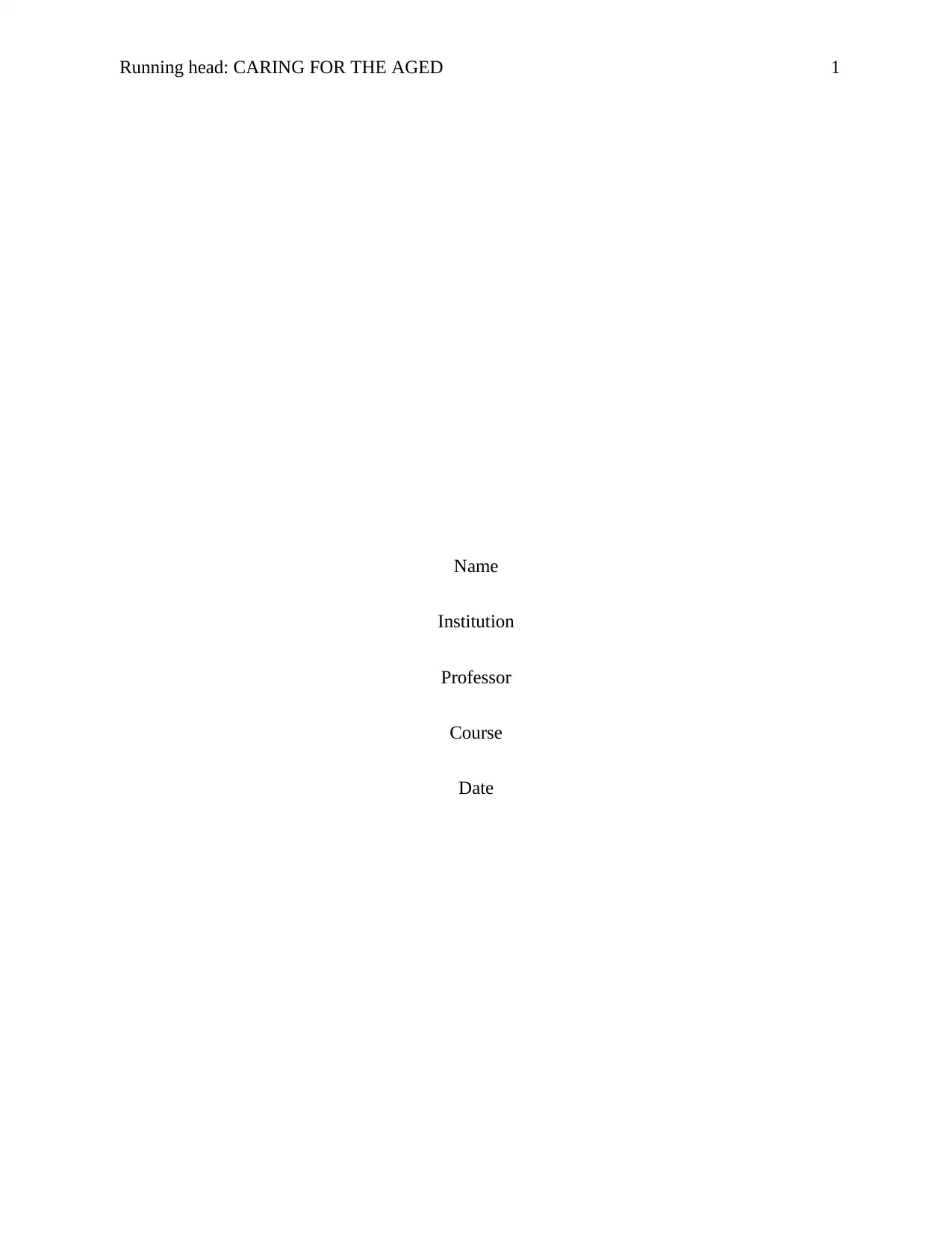
Running head: CARING FOR THE AGED 1
Name
Institution
Professor
Course
Date
Name
Institution
Professor
Course
Date
Paraphrase This Document
Need a fresh take? Get an instant paraphrase of this document with our AI Paraphraser
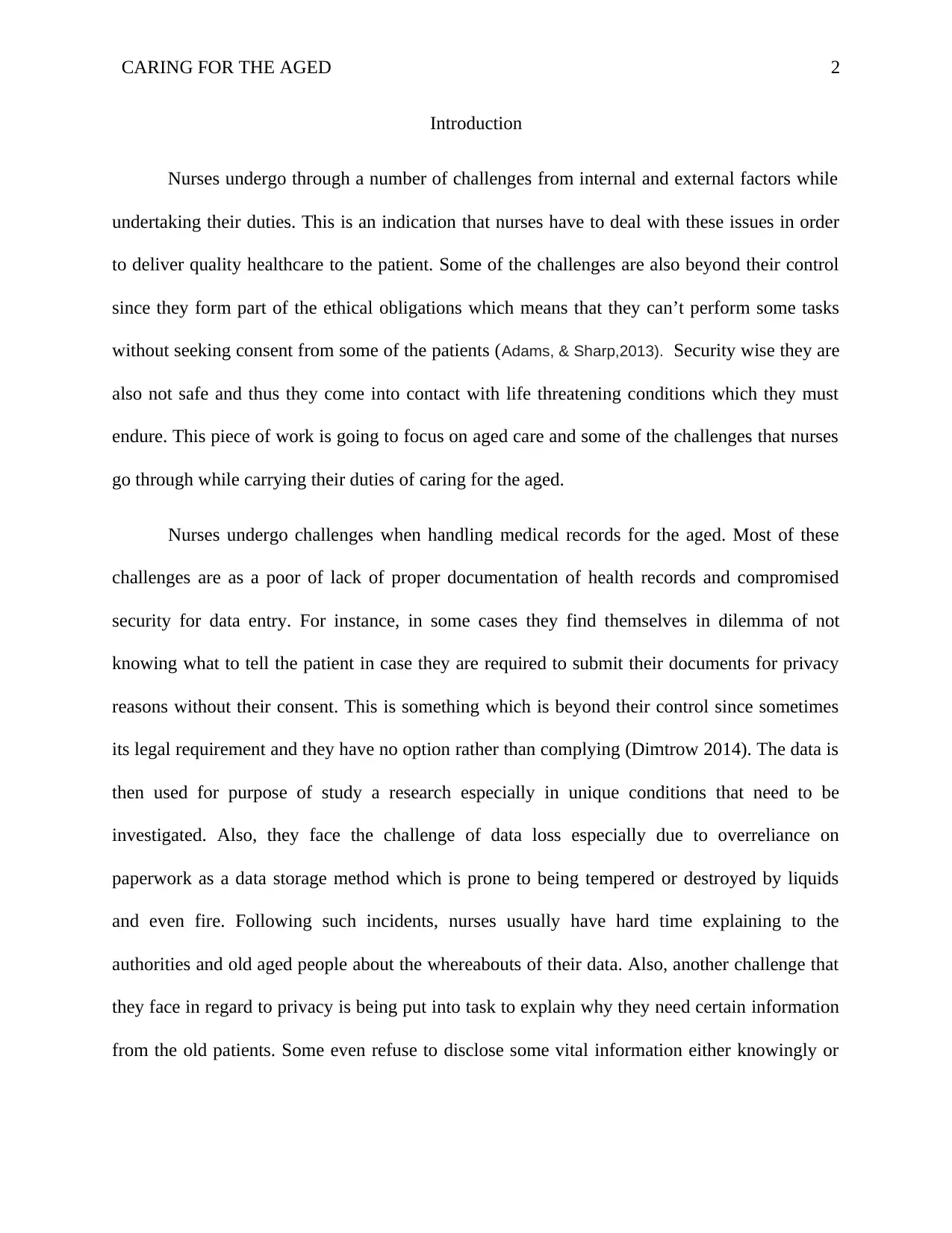
CARING FOR THE AGED 2
Introduction
Nurses undergo through a number of challenges from internal and external factors while
undertaking their duties. This is an indication that nurses have to deal with these issues in order
to deliver quality healthcare to the patient. Some of the challenges are also beyond their control
since they form part of the ethical obligations which means that they can’t perform some tasks
without seeking consent from some of the patients (Adams, & Sharp,2013). Security wise they are
also not safe and thus they come into contact with life threatening conditions which they must
endure. This piece of work is going to focus on aged care and some of the challenges that nurses
go through while carrying their duties of caring for the aged.
Nurses undergo challenges when handling medical records for the aged. Most of these
challenges are as a poor of lack of proper documentation of health records and compromised
security for data entry. For instance, in some cases they find themselves in dilemma of not
knowing what to tell the patient in case they are required to submit their documents for privacy
reasons without their consent. This is something which is beyond their control since sometimes
its legal requirement and they have no option rather than complying (Dimtrow 2014). The data is
then used for purpose of study a research especially in unique conditions that need to be
investigated. Also, they face the challenge of data loss especially due to overreliance on
paperwork as a data storage method which is prone to being tempered or destroyed by liquids
and even fire. Following such incidents, nurses usually have hard time explaining to the
authorities and old aged people about the whereabouts of their data. Also, another challenge that
they face in regard to privacy is being put into task to explain why they need certain information
from the old patients. Some even refuse to disclose some vital information either knowingly or
Introduction
Nurses undergo through a number of challenges from internal and external factors while
undertaking their duties. This is an indication that nurses have to deal with these issues in order
to deliver quality healthcare to the patient. Some of the challenges are also beyond their control
since they form part of the ethical obligations which means that they can’t perform some tasks
without seeking consent from some of the patients (Adams, & Sharp,2013). Security wise they are
also not safe and thus they come into contact with life threatening conditions which they must
endure. This piece of work is going to focus on aged care and some of the challenges that nurses
go through while carrying their duties of caring for the aged.
Nurses undergo challenges when handling medical records for the aged. Most of these
challenges are as a poor of lack of proper documentation of health records and compromised
security for data entry. For instance, in some cases they find themselves in dilemma of not
knowing what to tell the patient in case they are required to submit their documents for privacy
reasons without their consent. This is something which is beyond their control since sometimes
its legal requirement and they have no option rather than complying (Dimtrow 2014). The data is
then used for purpose of study a research especially in unique conditions that need to be
investigated. Also, they face the challenge of data loss especially due to overreliance on
paperwork as a data storage method which is prone to being tempered or destroyed by liquids
and even fire. Following such incidents, nurses usually have hard time explaining to the
authorities and old aged people about the whereabouts of their data. Also, another challenge that
they face in regard to privacy is being put into task to explain why they need certain information
from the old patients. Some even refuse to disclose some vital information either knowingly or
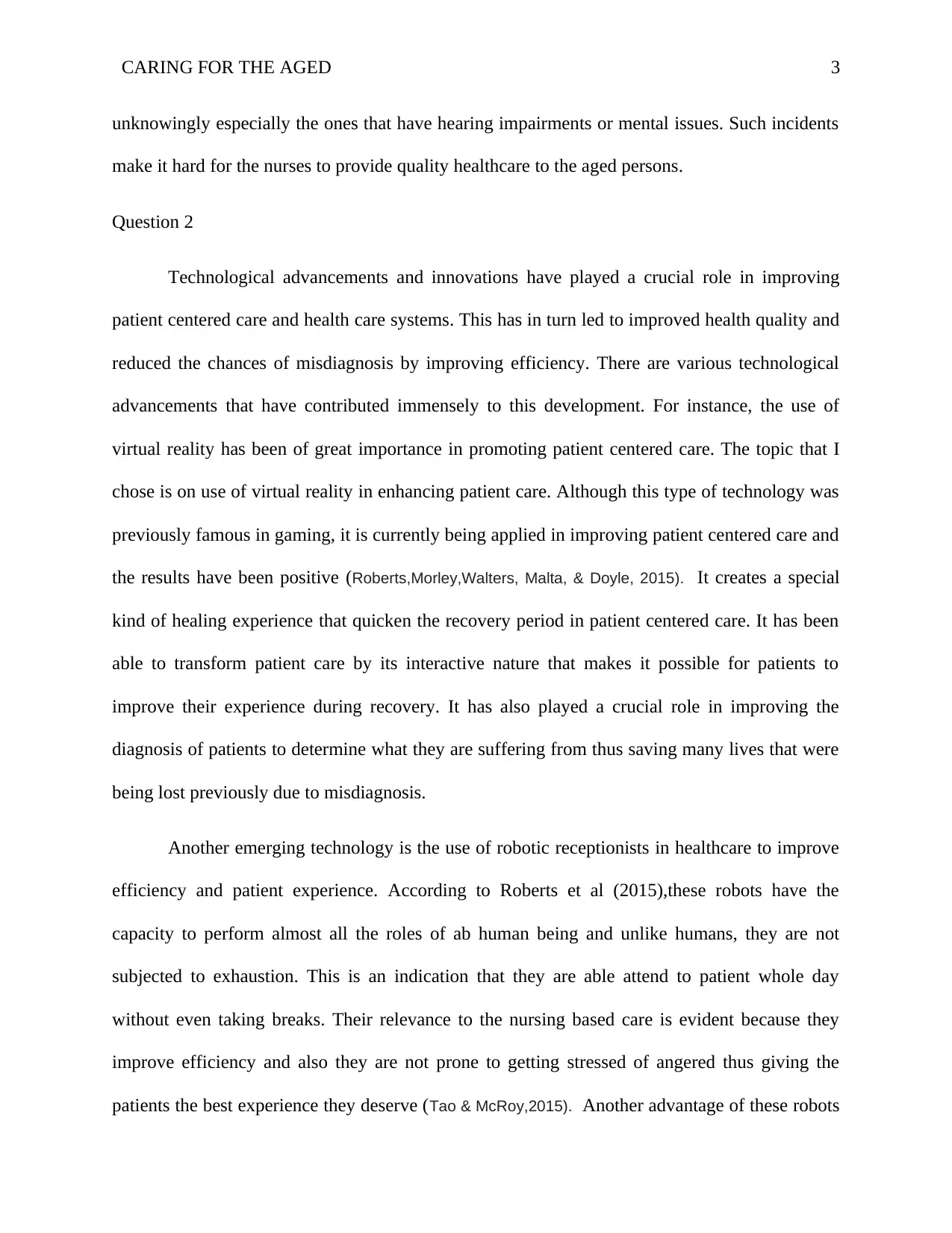
CARING FOR THE AGED 3
unknowingly especially the ones that have hearing impairments or mental issues. Such incidents
make it hard for the nurses to provide quality healthcare to the aged persons.
Question 2
Technological advancements and innovations have played a crucial role in improving
patient centered care and health care systems. This has in turn led to improved health quality and
reduced the chances of misdiagnosis by improving efficiency. There are various technological
advancements that have contributed immensely to this development. For instance, the use of
virtual reality has been of great importance in promoting patient centered care. The topic that I
chose is on use of virtual reality in enhancing patient care. Although this type of technology was
previously famous in gaming, it is currently being applied in improving patient centered care and
the results have been positive (Roberts,Morley,Walters, Malta, & Doyle, 2015). It creates a special
kind of healing experience that quicken the recovery period in patient centered care. It has been
able to transform patient care by its interactive nature that makes it possible for patients to
improve their experience during recovery. It has also played a crucial role in improving the
diagnosis of patients to determine what they are suffering from thus saving many lives that were
being lost previously due to misdiagnosis.
Another emerging technology is the use of robotic receptionists in healthcare to improve
efficiency and patient experience. According to Roberts et al (2015),these robots have the
capacity to perform almost all the roles of ab human being and unlike humans, they are not
subjected to exhaustion. This is an indication that they are able attend to patient whole day
without even taking breaks. Their relevance to the nursing based care is evident because they
improve efficiency and also they are not prone to getting stressed of angered thus giving the
patients the best experience they deserve (Tao & McRoy,2015). Another advantage of these robots
unknowingly especially the ones that have hearing impairments or mental issues. Such incidents
make it hard for the nurses to provide quality healthcare to the aged persons.
Question 2
Technological advancements and innovations have played a crucial role in improving
patient centered care and health care systems. This has in turn led to improved health quality and
reduced the chances of misdiagnosis by improving efficiency. There are various technological
advancements that have contributed immensely to this development. For instance, the use of
virtual reality has been of great importance in promoting patient centered care. The topic that I
chose is on use of virtual reality in enhancing patient care. Although this type of technology was
previously famous in gaming, it is currently being applied in improving patient centered care and
the results have been positive (Roberts,Morley,Walters, Malta, & Doyle, 2015). It creates a special
kind of healing experience that quicken the recovery period in patient centered care. It has been
able to transform patient care by its interactive nature that makes it possible for patients to
improve their experience during recovery. It has also played a crucial role in improving the
diagnosis of patients to determine what they are suffering from thus saving many lives that were
being lost previously due to misdiagnosis.
Another emerging technology is the use of robotic receptionists in healthcare to improve
efficiency and patient experience. According to Roberts et al (2015),these robots have the
capacity to perform almost all the roles of ab human being and unlike humans, they are not
subjected to exhaustion. This is an indication that they are able attend to patient whole day
without even taking breaks. Their relevance to the nursing based care is evident because they
improve efficiency and also they are not prone to getting stressed of angered thus giving the
patients the best experience they deserve (Tao & McRoy,2015). Another advantage of these robots
⊘ This is a preview!⊘
Do you want full access?
Subscribe today to unlock all pages.

Trusted by 1+ million students worldwide
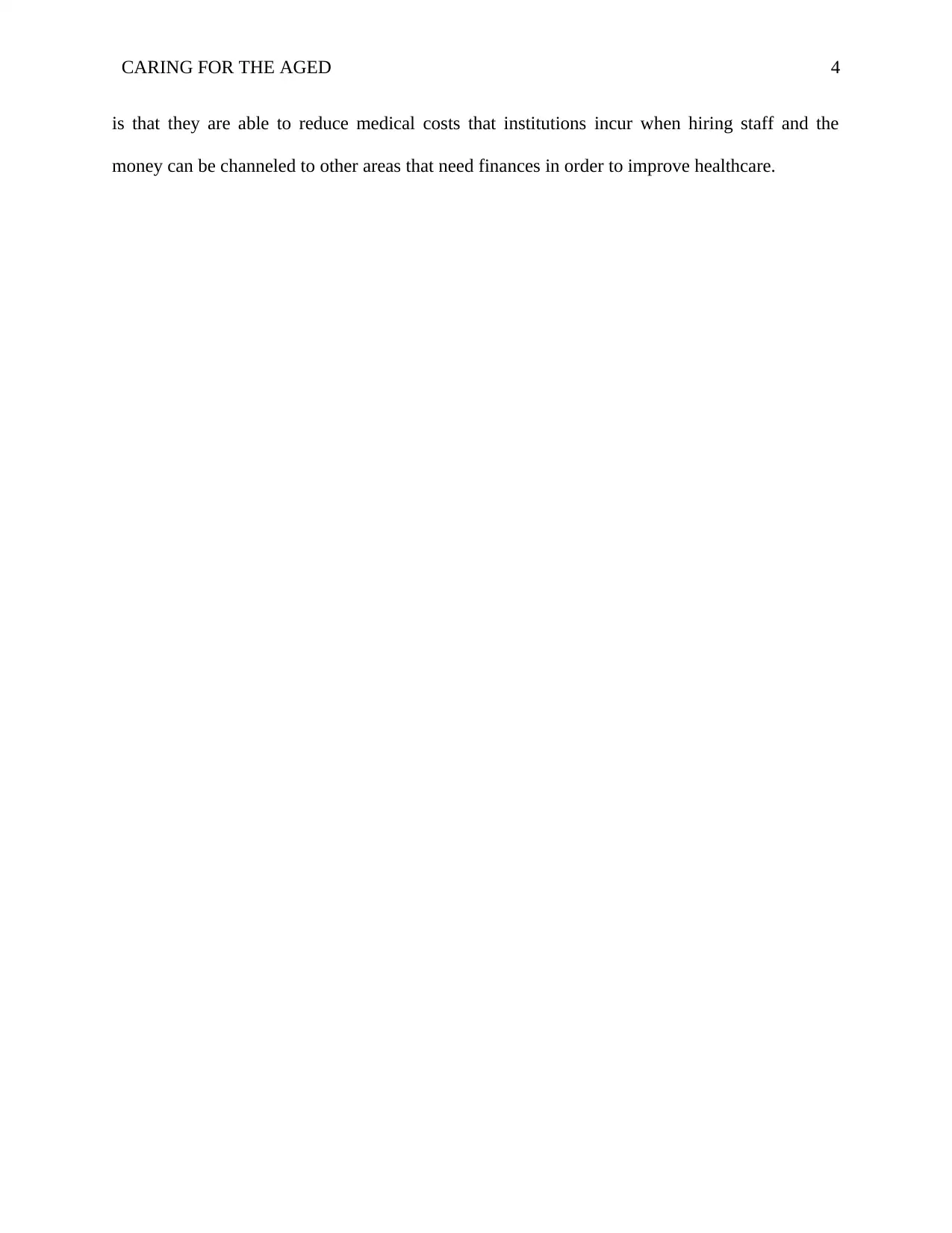
CARING FOR THE AGED 4
is that they are able to reduce medical costs that institutions incur when hiring staff and the
money can be channeled to other areas that need finances in order to improve healthcare.
is that they are able to reduce medical costs that institutions incur when hiring staff and the
money can be channeled to other areas that need finances in order to improve healthcare.
Paraphrase This Document
Need a fresh take? Get an instant paraphrase of this document with our AI Paraphraser
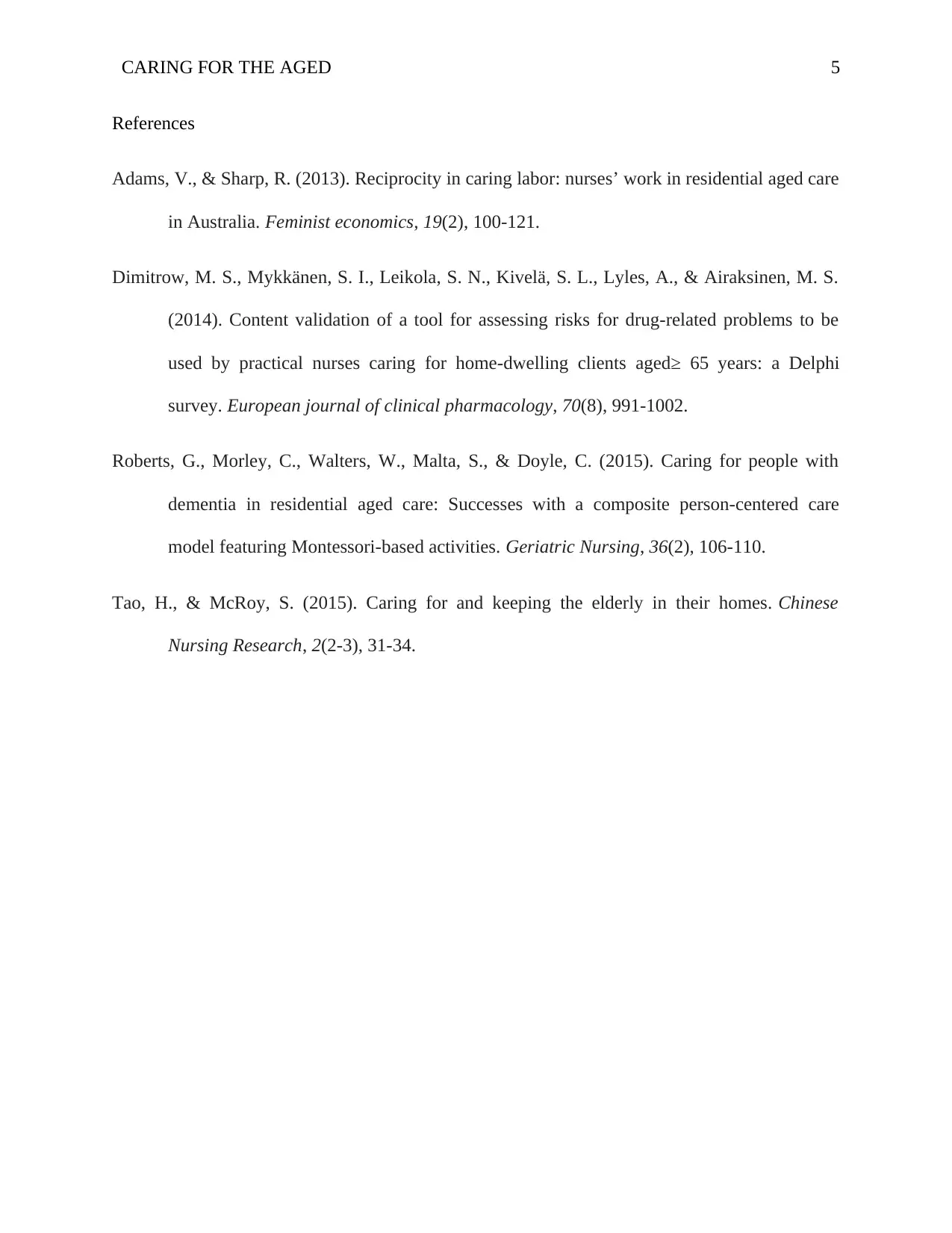
CARING FOR THE AGED 5
References
Adams, V., & Sharp, R. (2013). Reciprocity in caring labor: nurses’ work in residential aged care
in Australia. Feminist economics, 19(2), 100-121.
Dimitrow, M. S., Mykkänen, S. I., Leikola, S. N., Kivelä, S. L., Lyles, A., & Airaksinen, M. S.
(2014). Content validation of a tool for assessing risks for drug-related problems to be
used by practical nurses caring for home-dwelling clients aged≥ 65 years: a Delphi
survey. European journal of clinical pharmacology, 70(8), 991-1002.
Roberts, G., Morley, C., Walters, W., Malta, S., & Doyle, C. (2015). Caring for people with
dementia in residential aged care: Successes with a composite person-centered care
model featuring Montessori-based activities. Geriatric Nursing, 36(2), 106-110.
Tao, H., & McRoy, S. (2015). Caring for and keeping the elderly in their homes. Chinese
Nursing Research, 2(2-3), 31-34.
References
Adams, V., & Sharp, R. (2013). Reciprocity in caring labor: nurses’ work in residential aged care
in Australia. Feminist economics, 19(2), 100-121.
Dimitrow, M. S., Mykkänen, S. I., Leikola, S. N., Kivelä, S. L., Lyles, A., & Airaksinen, M. S.
(2014). Content validation of a tool for assessing risks for drug-related problems to be
used by practical nurses caring for home-dwelling clients aged≥ 65 years: a Delphi
survey. European journal of clinical pharmacology, 70(8), 991-1002.
Roberts, G., Morley, C., Walters, W., Malta, S., & Doyle, C. (2015). Caring for people with
dementia in residential aged care: Successes with a composite person-centered care
model featuring Montessori-based activities. Geriatric Nursing, 36(2), 106-110.
Tao, H., & McRoy, S. (2015). Caring for and keeping the elderly in their homes. Chinese
Nursing Research, 2(2-3), 31-34.
1 out of 5
Related Documents
Your All-in-One AI-Powered Toolkit for Academic Success.
+13062052269
info@desklib.com
Available 24*7 on WhatsApp / Email
![[object Object]](/_next/static/media/star-bottom.7253800d.svg)
Unlock your academic potential
Copyright © 2020–2026 A2Z Services. All Rights Reserved. Developed and managed by ZUCOL.





